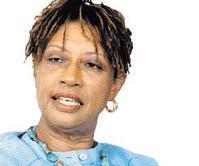
Beverley Anderson-Manley
ELEMENTS WITHIN the parish of St. James are hell-bent on creating havoc in the tourism capital, while ensuring that it becomes the murder capital of Jamaica. Just when it is felt that enough is enough, more murders of a most vicious nature are taking place. The impact of violence, generally, and murder in particular, is widespread and it takes its toll on families, children, communities and the wider society. The impact cannot be measured. We need to ponder on some of the decisions we took in the decades since Independence that are giving us the results we are getting now.
There are consequences that we see immediately and long-term unintended consequences that are a result of the decisions we take today. In this regard, some of the findings published in this newspaper last Friday from research carried out by Dr. Claudette Crawford-Brown, University of the West Indies lecturer, are instructive. The survey examined 115 children from two primary schools over a period of two years. The children were drawn from communities with a history of violence.
The survey reveals 80 per cent of children have witnessed five to eight murders or have known five to eight murder victims. In addition, the survey reveals that approximately 10 per cent of the sample had witnessed fewer than four murders, while the remaining 10 per cent had witnessed nine or more murders.
Our children Desensitised
As frightening as these survey findings are, perhaps the most disturbing is Crawford-Brown's observance that "only a small proportion of the sample exhibited symptoms of post-traumatic stress disorder and other disorders usually associated with exposure to that level of violence." In other words, the exposure to violence desensitises children and as Crawford-Brown notes, "If these children continue to grow up without intervention, the society may be producing a set of children who are at risk of developing, or have already developed a pervasive sense of hopelessness and an almost trivialised sense of death and dying." This is an unintended consequence of the high levels of violence in Jamaica today as a result of decisions we have made. Dare we contemplate 10 to 15 years into our future? Many of our children born today will be in the vulnerable age group of 14-24 years as both perpetrators and victims of violence.
Caught In the Crossfire
Dr. Maureen Samms-Vaughn, chairperson of the Early Childhood Commission, in delivering the 2006 GraceKennedy Lecture, explores the violent experiences of children "caught in the crossfire created by adults": Here are just a few of the experiences outlined in the lecture:
Before leaving home, two out of every three hear and see verbal aggression among adults in their homes. Before they leave home, one out of every three sees adults throw objects at each other or push, slap or grab each other and one out of every five watches adults kick or beat each other with an object, threaten to or actually use a gun or knife to hurt each other.
In the communities children traverse on their way to school or other activities, or at school, nine out of 10 see fighting, seven out of 10 see persons stoning each other, six out of 10 watch police making arrests. Five out of every 10 see a dead body, with death caused mainly by stabbing or shooting, four out of every 10 see someone stabbed and three out of every 10 see someone being shot at, someone being robbed and also witness gang wars. One out of every 100 will be shot at.
Killing Or Playing Fields
These findings have been largely ignored by the Jamaican society, perhaps because we, too, are becoming desensitised. Instead of creating 'playing fields', we are building 'killing fields'. "Is it any wonder then," as Samms-Vaughn asks that, "given children's experiences, they become perpetrators of violence?"
Building awareness can lead to behavioural change. It is time for adults who are building these killing fields to change their behaviour now. Our children need to be loved, nurtured and cherished. Our decisions today must take into account the relationship between decisions, consequences and unintended consequences.
Beverley Anderson-Manley is a political scientist, gender specialist and transformation coach. Email: BManley@kasnet.com.

